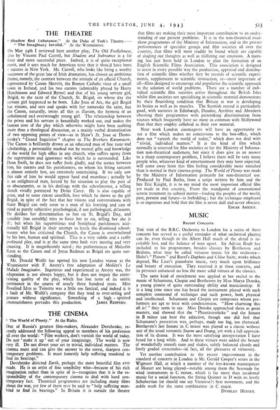Recent Concerts
MUSIC
THE visit of the B.B.C. Orchestra to London for a series of three concerts has served as a useful reminder of what orchestral playing can be, even though in the Albert Hall much of the detail is in- evitably lost, and the balance of tone upset. Sir Adrian Boult has included in his programmes, besides classics by Beethoven and Brahms, what may be called virtuoso music for the orchestra- Holst's " Planets " and Ravel's Daphnis and Chloe Suite, works which depend, like Liszt's pianoforte music, very much upon brilliance and beauty of execution. They received it at these concerts, and its presence enhanced no less the more solid virtues of the classics. The same kind of enrichment was applied at her recital to the music of Schumann, Chopin and Beethoven by Miss Marya Donska, a young pianist of quite outstanding ability and musicianship. It is a long time since one has heard the instrument played with such complete command of technique and such power, both physical and intellectual. Schumann and Chopin are composers whom per- formers are apt to treat with condescension. " How charming this all is! " they seem to say. Miss Donska approached them as great masters, and showed that the " Phantasiestiicke " and the Sonata in B minor can bear the adjective, though one did feel that Schumann's peroration was, perhaps, made too big, too rhetorical. Beethpven's last Sonata in C minor was played as a classic without any of the usual romantic Sturm and Drang, yet with a full apprecia- tion of its drama. It was the most satisfying interpretation I have heard for a long while. And to these virtues were added the beauty of wonderfully smooth runs and shakes, subtly balanced chords and finely graded crescendos—ixi fact, all the pleasures of virtuosity. Yet another contribution to the recent improvement in the standard of concerts in London is Mr. Gerald Cooper's series in the Wigmore Hall, at which a number of the less-known masterpieces of Mozart are being played—notable among them the Serenade for wind instruments in C minor, which is far more than incidental music for a social function, the String Quintet in D with its lovely Schubertian (or should one say Viennese?) first movement, and the noble work for the same combination in C major.
DYNELEY HUSSEY.


























 Previous page
Previous page